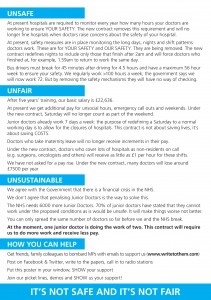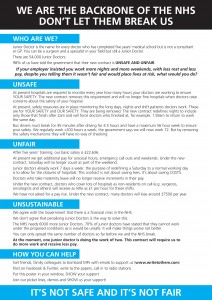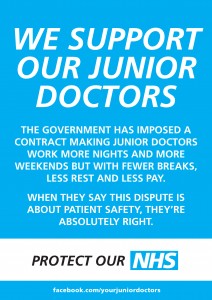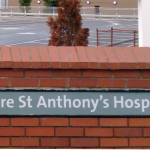This is once in a generation fight, if we lose, there will be no NHS for the next.
Junior doctor, and friend of KOSHH, Dr Ruhe Chowdhury is a member of a new organisation called "Your Junior Doctors". They have launched a campaign, aimed at getting information out about the junior doctors' contract negotiation. They have produced a range of leaflets and window signs to this end, along with a Facebook Group, a Twitter account, a website and a crowd-funding page. Ruhe has written the following piece for KOSHH:
The NHS and those who work in it are under unprecedented constraints and the Junior Doctors contract negotiations are a small part of a larger debate as to how we fund, and deliver world class care. I have worked in the NHS for over 10 years, in that time I have seen the progressive squeeze on funding, the drive to hit targets and not serve the patients and the effects of Whitehall policy on my patients and colleagues.
The Junior Doctors contract debate has taken many, including us by surprise. We have never been a political body, preferring to focus on the coalface of providing patient care rather than concentrating on the managerial aspects of healthcare delivery. However, that has now forever changed. This new contract, the details of which were finally revealed on the 31st of March 2016 will have huge implications on the doctors, their training, the provision of healthcare, continuity of that care and the safety of the patients in the delivery of services. Not only that, the Equality Impact Assessment carried out by the Department of Health itself stated that the contract is unfair to female doctors who make up 52% of the medical workforce.
So why are we up in arms over this contract?
- The Department of Health is not going to employ any more doctors to expand 7-day elective services within the NHS. We already provide emergency 7-day care, but don’t have the man power to do any more.
- As things stand we need 6000 more doctors to cover the elective 5-day NHS service. When you go into hospital the chances are the junior doctors looking after you, are doing the job of two or three doctors. If you the spread the same number of doctors over more days, there will be more ‘gaps’ where the doctors will have to cover more work for each other.
- To provide a fully 7 day elective NHS we will need to almost double the current workforce.
- The Department of Health through a Freedom of Information request could not tell us how many junior doctors it thinks work at weekend at present. This means that they don’t know what they are trying to improve on, let alone be able to assess the impacts of it on patient care.
- Our current contracts come with certain safety measures to cover the different shifts junior doctors do, that’s nights, long days (13 hours), etc. The government is redefining the definition of these shifts, which means you lose these safety measures. So for example a shift that finishes at 1:59am or starts at 3am does not count as a night shift and you can be timetabled to come back to work the same day.
- Every year the hospital is legally required to independently check the working hours of the junior doctors. If it is found to be in breach of the safety procedures then the hospital is fined. The new contract removes this requirement and the fine.
- The government say that we are getting a 13.5% pay rise, this is a disingenuous claim, and actually many doctors will see a fall in their earnings by roughly £7500.
- In the new contract we will lose continuity of care, which is vital in patient management, getting to know your patients and facilitating all aspects of their care. It will also mean that the training of junior doctors will suffer as they will not be able to learn from other doctors as the workforce will be more fragmented.
- The government have admitted that this contract will affect female doctors disproportionately. Their suggestion to mitigating this unfairness is to live closer to extended family members. Junior doctors are expected to live close to the hospitals they work for, some are contractually required to be within 20 minutes. Junior doctors are moved around every 6 months geographically as part of their training and therefore living near family is not useful.
- Women comprise 59% of junior doctors, and 52% of the whole medical workforce. In some medical schools, up to 70% of students are women and given the trend of girls in academia these statistics are not going to change. We should be encouraging our brightest people to become health professionals, and this contract in its own words, does not.
Hospital closure plans
Most of the general public are unaware of what is happening to the NHS, they do not see the link between contract changes and changes to the whole of the NHS. This is part of a bigger debate and how we deliver healthcare in the UK. For example, there are plans to close district general hospitals (DGH) in England, if your DGH was closed and the only time you could see a specialist was at 6pm on a Saturday then you would have to attend that appointment. To this end there is a need to make the workforce cheaper to allow for more Saturday clinics to be open.
I work with a group of grass roots junior doctors, with an aim towards disseminating information to the general public and other junior doctors about the Junior doctor’s contract, the implications of this contract in the wider debate of the NHS and the issues facing the NHS. We have worked with local activists, differing unions, pressure groups, journalists, lobbyists, essentially anyone who has skills and can lend a hand to produce information leaflets, organise local community sessions, "Meet the Doctor" events, rallies and anything that we think will improve public engagement with the debate of the NHS. Information about our events can be found on Facebook, Twitter,  and our website. We are aiming to get our message about the NHS out to as many people as possible. All of this is facilitated through our crowdfunding page to help fund the things that actually need paying for.
and our website. We are aiming to get our message about the NHS out to as many people as possible. All of this is facilitated through our crowdfunding page to help fund the things that actually need paying for.
The public have been amazing in this fight for the Junior Doctors and the NHS. We want to ensure that they are aware of what is happening to the NHS and how we can protect it. We will continue this fight, this is once in a generation, as if we lose, there will be no NHS for the next.
Facebook: www.facebook.com/yourjuniordoctors/
Twitter: @YourJuniorDrs
Website: yourjuniordoctors.wordpress.com
Email: yourjuniordoctors@gmail.com
Crowdfunding: https://crowdfunding.justgiving.com/wesupportourjuniordoctors
Disclaimer: The views and statements expressed above do not necessarily reflect the views or opinions of the Keep Our St Helier Hospital (KOSHH) campaign.

















